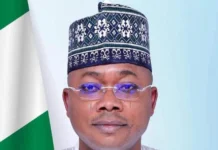As the African Plant Breeding Academy (AfPBA) graduates the first batch of plant breeders, at the International Centre for Research in Agroforestry Centre (ICRAF) in Kenya, the New Partnership for Africa’s Development (NEPAD) has suggested that there is the need for the Ministers of Agriculture in Africa to own orphan crops.
Speaking at the end of a six weeks training of 21 scientists from 2leven countries and 19 institutions, Director of NEPAD’s African Biosafety Network of Expertise, Dr. Diran Makinde who represented NEPAD CEO Dr. Ibrahim Mayaki stated that although the African Orphan Crop Consortium (AOCC) was behind the success story, the long term goal would be support from the private sector and African governments.
“We want political buy in. Ministers of Agriculture need to own the orphan crops. The fight to combat hunger and preserve Africa’s indigenous foods is on.
It is all about food security and improving the quality of life of our farmers,” Dr. Makinde said.
Among the 21 scientists, who would return to their various countries to work on the neglected crops that are central to their peoples’ nutrition and culture, especially now that the drive to work with the genetic richness of the continent’s traditional diets is long overdue,were Nigerians.
Dr. Sunday Makinde, a botanist from Lagos State University is breeding the fluted pumpkin; on the reproductive biology of the fluted pumpkin – a vine from the rain forest ecosystem. Its seeds and leaves are used in daily dishes called egusi and ogbono.
“The problem is that you cannot tell the male and female plant apart until they flower. Only the female produces pumpkin so the farmers cannot tell which to grow when they are young,” he says adding, “Its leaves are fed to anaemic children.”
Godson Nwofia, an associate professor from the Michael Okpara University of Agriculture is a cocoyam researcher – a crop, which like other neglected crops, is almost undocumented – at least in Africa. Nwofia said: “If you go to the internet, you get little or no information. Production in Nigeria used to be the world’s highest but has halved because of the Taro leaf blight,” he observed and asked, “If we do not work on it, how will we recover it?”
Wonder Nunekpeka, who is from the Biotechnology and Nuclear Agricultural Research Institute, Ghana is working on Hibiscus Sabdariffa said: “My crop has been an orphan but is not anymore! I will be a father for it.” He proudly intends to be a parent to the neglected crop, Hibiscus Sabdariffa.
Dr. Firew Mekbib, an associate professor at Haramaya University focuses on the Ethiopian potato. “We need to de-orphanize and microtuberise it,” he said.
Chief Agricultural Officer for Mars Inc., which funds AfPBA, Dr. Howard Shapiro said that “Globally, only 57 plants have ever been genetically sequenced. We are adding another 101,” adding that the trained professors and heads of research institutes “now had the ability to make decisions about plant breeding quicker, which will lead to higher yielding and more nutritious plants.”
Davis’ Allen van Deynze who coordinated the course said that Orphan crops were crops that were under-researched and undervalued by decision makers because they figure little in global trade. “Yet they are vital sources of energy (e.g. Shea oil), protein and micro-nutrients (e.g. spider plant) in resource-poor societies,” he said.
The African Orphan Crop Consortium (AOCC), which would train 250 plant breeders and technicians over the next five years, is composed of AfPBA, AU’s New Partnership for Africa’s Development (NEPAD); Mars; Google; ICRAF; BGI; Life Technologies; World Wildlife Fund (WWF); University of California, Davis; University of Ghent; iPlant Collaborative; and the International Livestock Research Institute.




